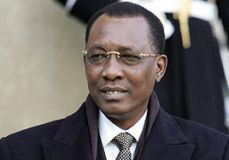Chad, country is teetering on brink – ICG
June 1, 2006 (DAKAR) — Chad, which has had a history of turbulent change since independence, is again teetering on the brink of a crisis, the independent think-tank International Crisis Group said in a report released on Thursday.
 Although President Idriss Deby last April successfully repelled a rebel attack at the gates of the capital N’Djamena, the victory “settled nothing on the military front and underscored the political fragility of the regime,” said a 38-page report published by the Brussels-based group.
Although President Idriss Deby last April successfully repelled a rebel attack at the gates of the capital N’Djamena, the victory “settled nothing on the military front and underscored the political fragility of the regime,” said a 38-page report published by the Brussels-based group.
“The crisis is far from resolved, and is likely to be an enduring one,” it added.
Deby, who has faced a string of mutinies, rebel attacks and high-level defections since December, is also having to contend with the spill-over from conflicts in Sudan’s Darfur region and the Central African Republic (CAR).
But despite his government’s claims that Sudan is arming Chadian rebels, the current crisis is as much about a deficit of democracy as it is about regional crises, said the ICG report.
“It is equally the manifestation of the political crisis of the semi-authoritarian regime and the absence of domestic political space that has militarised all political differences in the country,” the report said.
While the country has known more political freedom since Deby took over in 1990, his party’s decision last year to change the constitution to allow him to run for a third term was a final straw for much of the opposition.
Wide-scale corruption meanwhile appears to be responsible for economic stagnation at a time when new oil revenues should have improved the standard of living for ordinary Chadians.
In Darfur, Zaghawa people from the president’s tiny ethnic group are helping Darfur rebels to combat Khartoum, while the Sudanese authorities have countered by aiding Chadian rebels, notably the FUCD, one of the three most significant armed rebel groups.
Peace in Sudan and CAR are key to helping Chad resolve 25 years of strife, but the core of the problem lay at home, the report said.
“If a solution exists in Chad, the first step will have to be to seek national dialogue. The consensus that existed after the departure of (former president) Hissene Habre evaporated after the 2001 and 2002 elections. The May 2006 elections have made political debate even more difficult,” it said, referring to Deby’s 3 May re-election in a poll boycotted by the opposition.
The alternative scenario was continued simmering conflict within Chad that would feed the violence taking place in neighbouring Darfur and CAR.
(IRIN)
For more about the report, please go at http://www.crisisgroup.org/home/index.cfm?l=1&id=4148
